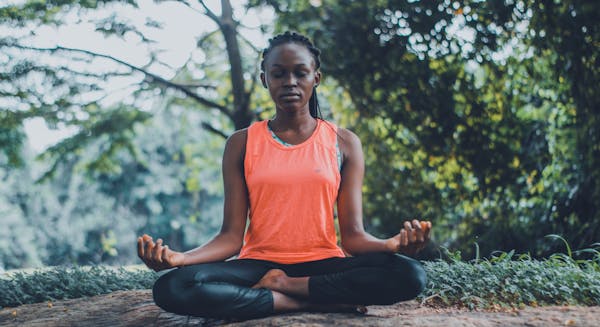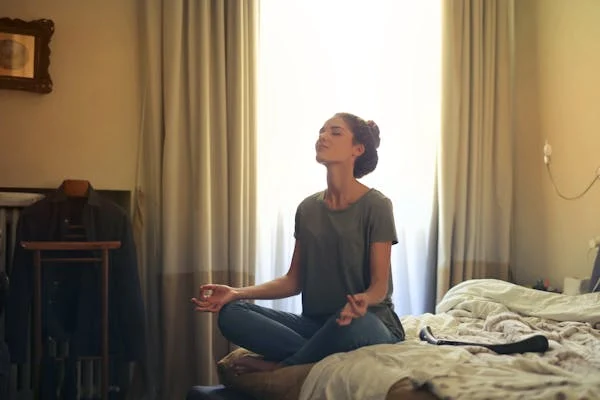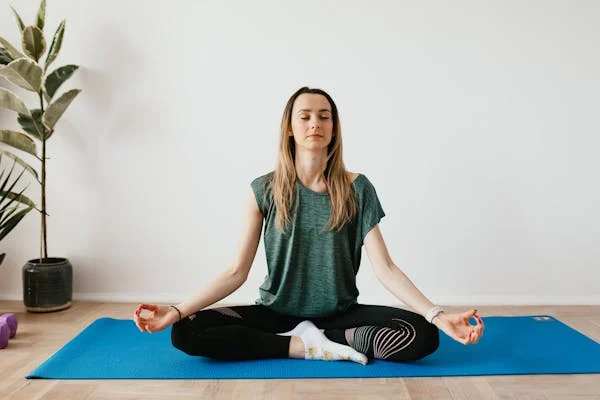Table of Contents
Meditate – For thousands of years, meditation has crossed the lines of culture and belief, being a practice applied by all kinds of people worldwide as a way of growth and personal development for well-being. Whether one seeks relief from stress, balances their emotions, enhances their health, or grows in the spirit, there is something special in meditation for you.
So why meditate? What makes this ancient practice beneficial for modern-day people in this frenetic world?
We are going to examine why meditation is necessary, how it works, and how breathing techniques can augment the benefits of your practice.
1. Meditation Reduces Stress and Anxiety
Understanding the Impact of Stress
Stress and Mental Health: Chronic and pervasive stress could be related to various mental illnesses such as anxiety, depression, and burnout. Simply put, the pressures of daily life place the modern-day person in a state of chronic stress-from work-related constant demands to social and personal issues.
Meditation’s Purpose: Regular meditation helps one manage and then reduce stress. Calming the mind and focusing on the present moment, it allows you to let go of the mental clutter that feeds anxiety.
How Meditation Reduces Stress
Diminishing Cortisol Levels: A number of studies have also shown that meditation reduces the cortisol levels in the human body. Cortisol is called the “stress hormone,” and high levels of the same hormone have been associated with a number of health disorders, the most common being high blood pressure and heart disease.
Breathing for Stress Relief: Breathing exercises, such as deep belly breathing, activate the parasympathetic nervous system, which is responsible for calming the body. When you focus on your breath, it helps counteract the stress response by promoting relaxation.

2. Improves Mental Clarity and Focus
Sharpening Your Focus Through Meditation
Mental Fuzz and Distractions: In the digital age, distractions abound. Whether it’s the buzz of your phone with notifications, constant multitasking, or the constant inflow of information, it’s easy for your mind to become scattered and unfocused.
Improved Concentration: Meditating every day trains the brain to be more focused. As you continue to sit still and refocus your attention to your breath, you improve your ability to focus on the issue at hand.
The Role of Breathing in Mental Clarity
Breathing for Focus: Mindful meditation often consists of breathed consciousness to assist one in focusing their thoughts. Focusing the attention on breathing soothes the mind for more focused concentration. The regulated breathing helps quiet mental chattering, thereby attaining a more concentrated state of mind.
3. Meditation Enhances Emotional Health and Resilience
Emotional Benefits of Meditation
Emotional Regulation: Meditation enables you to be more aware of your emotions and regulate them. Mindfulness helps you be more in touch with your emotional reactions, hence allowing you to react more thoughtfully rather than impulsively.
Emotional Resilience: Meditaiton gives you mental space where you could observe your emotions without judgment. You develop better emotional resilience because you learn how to handle tough feelings in a calm, balanced manner.
Breathing for Emotional Regulation
Breathing Techniques for Calm: Focusing on deep, rhythmic breathing can trigger the relaxation response and reduce feelings of anxiety, anger, or frustration. Slowing your breathing can bring emotional balance and stability to your life.


4. Quality Sleep
Meditation and Sleep
Other challenges in sleeping include when one has an overactive mind, stress, or anxiety. In some cases, sleep disorder has such effects on health and well-being.
Good Night’s Sleep by Meditation: Meditation is also a mind calmation technique that quiets the mind and calms the body. It improves the quality of your sleep since it induces relaxation as well as a decrease in restlessness.
How Breathing Will Improve Your Well Rested Sleeping
Breathing for Better Sleep: Breathing techniques, such as deep abdominal breathing, can be soothing to the nervous system, setting it up for sleep. Pre-sleep mindfulness breathing releases remaining tension so that the quality of sleep will be improved and deeper.
5. Meditation Aids Physical Well-being
The Physiological Well-being Effects of Meditation
Improved Heart Health: Meditation has been proven to reduce blood pressure and heart rate, thus reducing the risk of cardiovascular diseases. Mindfulness meditation will help you promote overall heart health by reducing stress, which is a significant contributor to heart-related issues.
Increased Immunity: Meditation improves the immunity system. The body is then more robust to illness. Meaning that consistent meditation practice has been proven to reduce inflammation and boost the healing and immune capacity of the body against infections.
Breathing for Physical Health
Breathing and Immune: The practicing method of breathing through meditation encourages increase oxygen. Circulation becomes more by developing strength as well as positive aspects inside, thus a human concentrating completely on breathing controls the condition going inside his body that helps a human body in correct growth.


6. Increases Self-Knowledge, leading to excellence in each individual
Establishing Self-Development
Mindfulness: During meditation, the process develops consciousness in your self; a person is more connected to the inside thoughts, desires, and emotions. By these patterns of activities, wrong thought patterns, or areas that require improvement and healing are understood.
Self-Discovery Through Personal Growth: Developing consciousness through meditation teaches people how the good and weak points exist in individuals. Hence, the process of self-developing and augmenting is an uninterrupted process.
How Breathing in Meditation Helps Self-Discovery
Breathing for Mindfulness: Focused breathing is actually an encouragement for present-moment awareness. Since you are already paying attention to your breath, you train the mind to focus on being entirely present, allowing for deeper insight about your thoughts and feelings.
7. Meditation Helps to Overcome Bad Habits and Addictions
Breaking Free from Bad Habits
Addiction and Habitual Behavior: Most people seek unhealthy coping mechanisms, such as smoking, overeating, or other addictive behaviors, to deal with stress or emotional pain. These habits can become ingrained over time, affecting mental and physical health.
Mindfulness and Behavioral Change: Mediation encourages mindfulness and makes a person aware of the negative cycle and behavior. Greater self-awareness of the triggers and how one responds to them can help avoid falling into bad habits.
Breathing for Overcoming Addiction
Breath and Cravings: Breathing techniques are very effective in the management of impulse and cravings associated with addiction. This practice helps you interrupt the cycle of addiction and replace it with healthier, more mindful habits.
8. Promotes Greater Compassion and Empathy
Meditation and Emotional Connection
Develop compassion for others via meditation. It is in these moments that a person develops kindness with oneself as well as the other. Loving-kindness meditation or the metta practice is said to cultivate warmth among others by feelings of love, sympathy, even affection.
Qualitative increase of positive interaction: The more you meditate, the more you understand others’ needs. You can improve the quality of your relationships in addition to also becoming more emotionally supportive of those that surround you.
Breathing and Compassion
Breathing to be Human: Connect with others using breathing, where one can feel an intense human relationship. Compassionate breathing will call out kindness, compassion, and love that have an impact on human behavior and interactions.
9. Meditate for Spiritual Development
Deeper Spiritual Practice
Spiritual Awakening: Meditation is a direct route to spiritual growth. Whether you meditate for religious purposes or just to connect with your higher self, meditation helps clear the mind and make space for spiritual insight.
Though for some, it is a matter of connecting with a higher power, divine energy, or the entire universe, quiet contemplation and mindful breathing, respectively, can be very effectively employed to access a sense of spirituality that transcends your daily life.
Breathing and Spiritual Awareness
Breathing for Spirituality: Conscious breathing is a technique often used in spiritual practices, to quiet the mind and move in tune with the higher consciousness. A focus on breath helps you link with something larger than yourself, a feeling of peaceful and fulfilling spirit.


10. Meditation For All Ages and Lifestyles Accessibility
Flexibility: Meditation can be done at any time and in any place. There is no restriction on age or background for the practice of meditation, which can be done whether you have 5 minutes or an hour.
Adaptable Practices: Meditation can be tailored to fit your needs and schedule. Seat meditation, walking meditation, or guided audio tracks are a few ways of practicing meditation.
Breathing for Immediate Help
Breathing Anywhere: Honestly, if you want some quick meditation technique, focusing your mind on breath will help bring immediate relaxation and reduce stress instantly. It doesn’t matter where you are-from work to your home or maybe during your trip.
Conclusion
Meditation is not just a mental exercise but a very powerful tool that will benefit your mind, body, and spirit. It can change your life if you want peace of mind, emotional well-being, better physical well-being, or spiritual growth.
Using breathing techniques, you can make meditation more meaningful by giving you an added dimension for focusing, relaxation, and balance of emotions.
So why would you want to meditate? For meditation allows you to lead a more peaceful, connected and fulfilling life. So go ahead, give it a shot today and witness for yourself the fruits of this old habit.
